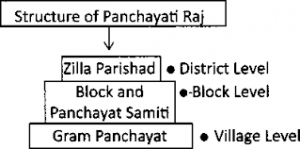
The State of Uttarakhand has 13 districts, with 49 Tehsils, 95 Development Blocks, 671 Nyaya Panchayats and 7227 Gram Panchayats. The total population of 84.89 lakhs of the State is confined to 360 Zila Panchayat wards, 3152 Kshetra Panchayat wards and 46734 Gram Panchayat wards.
Existing Development Administration Development
Administration and Management at Uttarakhand’s villages are mainly based on a three-tier structure i.e. Gram Panchayat, Kshetra Panchayat and Zila Panchayat.
Gram Panchayat
Panchayat Raj System has been adopted in order to strengthen the village functions and powers for undertaking development programmes. Earlier Village Panchayats had limited powers. The transparency aspects was lacking in village development schemes. The 73rd CAA was adopted and Finance Commission was set up which transformed the Panchayati Raj System. The Village Panchayats were strengthened and given adequate powers to formulate development schemes, to implement and monitor implementation at village level. The Gram Panchayat is headed by Gram Pradhan who is the elected representative. The Village Level Officer (Gram Panchayat Development Officer) is a representative of the administration, who works under District Panchayati Raj Officer and Block Development Officer. Gram Panchayat Development Officer works at the grass root level i.e. at the Village Panchayat level. The funds are managed at Panchayat level. Panchayats also convene meeting of the Gram Sabha to assess the problems of the village and to identify the developmental schemes within their respective areas, where government officials are also invited.
The three tier structure of development administration within the district functions in close co-operation with administration and democratic set up at each level.
Kshetra Panchayat
Block Pramukh is an elected representative from the Kshetra Panchayat who is the political head of the block. The Block Development Officer (BDO) who is administrative head of the block, co-ordinates the work of Kshetra Panchayat under his jurisdiction at block level. The block level committee assists the administration to identify and take-up the development works at block level.
Zila Panchayat
President is the hierarchical head of the Zila Panchayat. The Additional Chief Development Officer of Zila Parishad is its administrative head. There are six different development committees constituted by Uttarakhand, Kshetra Panchayat and Zila Panchayat Act, 1961. Every committee has five members. Main functions of committees are to prepare the plan/scheme for development of Zila Panchayat areas. These are as follows:
- Planning and Development Committee: The planning and development committee is headed by President, Zila Panchayat. The Planning & Development Committee plays an important role for making and forwarding the development proposals for the general meeting. President and Vice president of Zila Panchayat, MLAs & local MP, Representatives of Zila Panchayat & Block Pramukh of Kshetra Panchayats approve the proposals in general meeting. After approval of general meeting, the proposals and schemes are implemented by Additional Chief Development Officer, Zila Panchayat.
- Education Committee: Implementation of programmes/schemes relating to basic, adult and unofficial education in the district.
iii. Construction–work Committee: All type of construction works and maintenance and ensuring the quality of government assets.
- Health and welfare Committee: Committee is concerned with treatment, health & family planning and social welfare matters of the district.
- Administrative Committee: This Committee is concerned with matter relating to the Staff of Zila Panchayat and rationing system.
- Water Management Committee: Implementing and maintenance work related to Tube wells and Drinking water etc.
UKPCS Notes brings Prelims and Mains programs for UKPCS Prelims and UKPCS Mains Exam preparation. Various Programs initiated by UKPCS Notes are as follows:-
- UKPCS Mains Tests and Notes Program
- UKPCS Prelims Exam 2024- Test Series and Notes Program
- UKPCS Prelims and Mains Tests Series and Notes Program
- UKPCS Detailed Complete Prelims Notes
